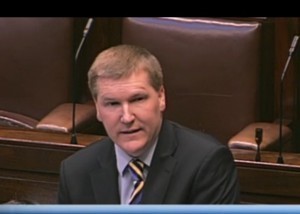26 January 2016
By Elaine Murphy
elaine@TheCork.ie
Four year refund period severely disadvantages honest taxpayers
Fianna Fáil Finance spokesperson Michael McGrath TD (based in Carrigaline, Co Cork) has called for an extension to the current maximum period of four years over which a taxpayer can make a reclaim for any amounts they have overpaid to Revenue.
At present if a taxpayer becomes aware that they have overpaid tax in a period further back than four years they cannot make a claim for a refund despite having never lawfully owed the sum involved. As the law stands Revenue are statutorily debarred from making repayments of tax outside of the four year period from the end of the tax year in respect of which the tax was paid, other than in very specific circumstances for example, where there is an arithmetical error in an assessment.
By contrast Revenue are permitted to carry out an audit or investigation for any period, where they believe a return of income was incorrect due to its having been completed in a fraudulent or negligent manner, or a Revenue officer has reasonable grounds for believing that a return does not contain a full and true disclosure of all material facts.
Deputy McGrath commented, “Many taxpayers are overwhelmed by the complexity of the tax system and through a lack of understanding fail to claim all of the credits and allowances that are due to them. For example many pensioners are unaware that if they earn less than €18,000 for a single person or €36,000 for a married couple they are entitled to an exemption from DIRT tax. Similarly some taxpayers may be unaware that they are entitled to claim a Home Carers Tax credit of €1,000 in respect of a spouse who is undertaking a care for a family member. The ability to claim medical expenses, a tax credit for having an incapacitated child or flat rate expenses related to employment are also areas over which many taxpayers have a lack of knowledge.
“I recently highlighted a situation concerning PAYE workers who had additional self- employment income and were paying PRSI on their non PAYE income even though they had no actual liability. Revenue’s online system did not alert them to the fact that they were not liable for PRSI on this income but in the case I dealt with the taxpayer only became aware of this after the limit for a refund had expired.
“The four year rule applies to all taxes, not just self-assessed taxes. It arguably affects PAYE taxpayers more severely as self-assessed taxpayers are obliged to file annual returns and in so doing can claim all their allowances and credits as a matter of course.
“I can understand for administrative purposes why it would be impractical for revenue to refund small amounts going back many years. However in some cases taxpayers can lose out on considerable sums by not being able to pursue a claim when they become aware of the overpayment they have made.
“I am proposing that the limit be increased to at least six years 6 years. I believe this strikes a fair balance between the interests of taxpayers and the need for efficiency in the operation of the tax system. This is an issue which Fianna Fáil will actively pursue in the next Dáil,” concluded Deputy McGrath.



